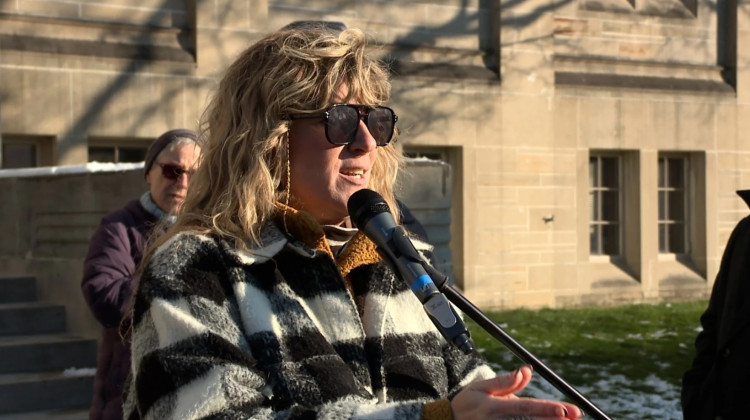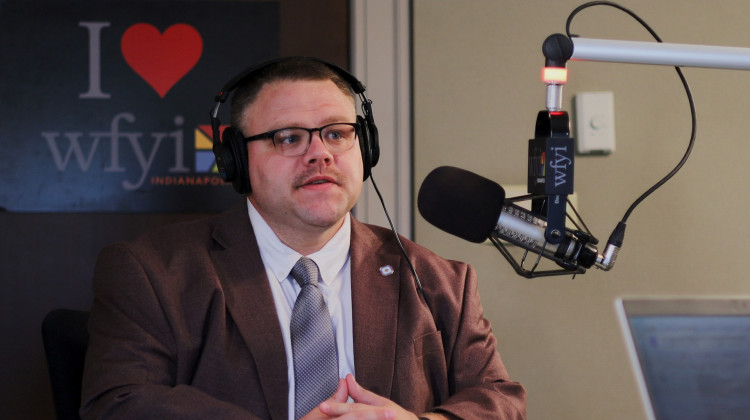
Indiana Commissioner for Higher Education Chris Lowery in his office on February 19, 2024.
Dylan Peers McCoy / WFYIAbout half of Indiana high school graduates head to college, a significant decline over the last 15 years. The falling enrollment rate is a worrying trend at a time when the state is attempting to increase the number of people with college degrees and post-secondary credentials.
The Indiana Commission for Higher Education began a research project this year to look at why high school graduates are not going to college and what policy changes could help.
The commission is working with a consulting firm that is conducting interviews, focus groups, and a survey. The results will inform the commission’s work and legislative priorities.
Reporter Dylan Peers McCoy spoke with Indiana Commissioner for Higher Education Chris Lowery about college affordability and why young people are skipping higher education.
This interview has been edited and condensed for clarity.
Dylan Peers McCoy: Experts say that more and more jobs are going to require higher education in the future. Yet the number of Indiana high school graduates choosing to go directly to college has been declining. It's fallen by 13 percentage points since 2008. What do you think is driving the decline in college enrollment?
Chris Lowery: Yeah, we think there are a number of factors. Chief among those factors that we've seen in research include affordability. And I think that's — you really have to pull that apart. Sometimes there's the perception of it. And sometimes there's a reality of it.
Maybe we can dig into that later. There is a questioning around career relevance: If I do X, will I be able to get this type of job? You know, most people have a job or a career in mind when they do some form of post-secondary training and education.
So something beyond high school. Most people have a plan. So there are questions amongst individuals: Will I get the outcomes that I'm looking for? And then, the other concerns that we hear — it's sort of a longer list. Is it accessible to me? Is it nearby? Some of those other factors in life.
McCoy: What do you say to people who say, "Look, I know people who got a college degree, and it just saddled them with a lot of debt?"
Lowery: What we've been trying to do, especially in the last year or so, is provide a lot more in terms of facts around affordability and also outcomes. So here are a couple of different things: One, Indiana's public institutions have been doing a really good job in the last now dozen or so years of holding tuition costs down.
Tuition rises have just been a big story nationally, and they should be. But in Indiana, we didn't realize this until last year when we started digging into the data. We've been sixth best at holding tuition down in Indiana.
But I think we had done kind of a lousy job of letting folks know: First of all, we're trying to hold those costs down in Indiana. Secondly, Indiana is first in the Midwest, and fifth in the nation in need- based financial aid.
McCoy: A lot of this conversation about higher education focuses on two- and four-year degrees, but Indiana has actually put a lot of attention on other kinds of post-secondary education. For example, the state pays for students to earn certificates in high-demand fields like healthcare and information technology. What kind of enrollment trends are we seeing in those areas?
Lowery: Prior to coming to the commission, not quite two years ago, I had led the workforce and career side of Ivy Tech Community College. Ivy Tech placed an incredible emphasis on that sub-associate degree space — industry certifications; certificates, generally 18 to 21 academic hours; technical certificates, generally around 30 hours — and said look, we are going to lean into this.
Indiana is fifth in the nation in sub-associate degree credentials. So to answer your question, it has been enormous the increase in focus on enrollment, and then I think even more importantly, the completion and awarding of those credentials.
Contact WFYI education reporter Dylan Peers McCoy at dmccoy@wfyi.org.
 DONATE
DONATE








 Support WFYI. We can't do it without you.
Support WFYI. We can't do it without you.